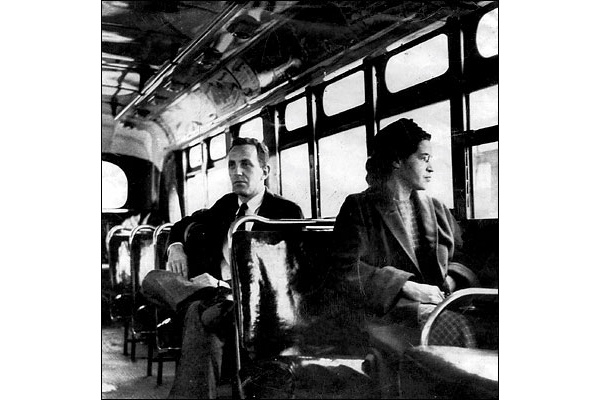Shocked that Barack Obama Will Be Succeeded by Donald Trump?

Rosa Parks
Victories over racial inequality in America are all too often followed by a racist backlash –sometimes involving incredible acts of violence. Emancipation brought a wave of white supremacist terrorism against African Americans in the South during Reconstruction. Lynching targeted those blacks who achieved personal success, or challenged Jim Crow laws or established racial etiquette, by “acting uppity,” as segregationists came to name such behavior. The election of Barack Obama to the Presidency in 2008 produced an unprecedented rise in political obstructionism and efforts to delegitimize him in Washington, D.C., as well as in the growth of hate groups, ugly stereotyping, and incidents of racial violence in the heartland.
Nowhere was this tendency more obvious than sixty years ago this month in Montgomery, Alabama, in the wake of the 1955-1956 bus boycott, nearly thirteen months after it began with Rosa Parks’s decision to stay seated. Word that the U.S. Supreme Court had upheld the federal court decision in Browder v. Gayle, overturning segregated seating on Alabama buses, reached Montgomery on December 20, 1956. The next day the black citizens of the city returned to the buses.
The violence began almost immediately. Someone fired a shotgun blast into Rev. Martin Luther King’s home in the wee hours of December 23. One day later, on Christmas Eve, a car pulled up to a local bus stop where a fifteen-year-old black girl was standing alone. Five men jumped out and beat her savagely, before taking flight. Shots were fired into an integrated bus on Christmas Day. King urged city officials to “take a firm stand.” Instead, they asserted that they would have to suspend bus service if the violence continued – thus doing what the segregationists wanted. Two days later, snipers fired another volley into an integrated bus, wounding a pregnant black woman in both legs. The city commissioners responded by temporarily halting bus service in the city.
What became known as Montgomery’s “night of terror” took place in the early-morning hours of January 10, 1957. King and Rev. Ralph Abernathy, his chief lieutenant in the boycott, had gone to Atlanta, where they and other black pastors were organizing the Southern Christian Leadership Conference in an attempt to reproduce the lessons of Montgomery across the segregated South. First, bombs exploded at the homes of Abernathy and Rev. Robert Graetz, a white Lutheran minister serving an all-black congregation. Then bombs went off at four black churches – Abernathy’s First Baptist Church, Bell Street Baptist Church, Hutchinson Street Baptist Church, and Mount Olive Baptist Church. Bombs were discovered and defused at Dexter Avenue Baptist Church, where King served as pastor, as well as at his home. Although suspected perpetrators of the bombings were arrested, all were either released after charges were dropped or acquitted at trial.

Pre-dawn bombing, January 10, 1957
These attacks were clearly acts of racial terrorism, targeting the pastors and churches that led the boycott. Up in Birmingham, Rev. Fred Shuttlesworth, who planned to test segregated seating on buses in that city the next day, was victimized when fifteen sticks of dynamite destroyed his parsonage on Christmas night. Miraculously, he survived the blast.
King, Abernathy, and some of the other pastors gathered in Atlanta wired a telegram to President Eisenhower, reciting the events that had occurred since the boycott ended and informing him that “A STATE OF TERROR PREVAILS” in Montgomery. They urged him to schedule a speech in the South in which he would condemn segregationist violence. Ike replied through an aide that such a move was not possible. For the time being, Montgomery blacks were left on their own.
This paints quite a different picture of the Montgomery bus boycott than we usually encounter. The episode on the boycott in the otherwise excellent Eyes on the Prize series on PBS ends with local blacks returning joyfully to the buses as the soundtrack plays “Leaning on the Everlasting Arms.” Popular histories of the boycott often conclude in similar fashion. But racial victories rarely end in unchallenged successes. The enemies of racial equality do not go quietly into that good night. Sixty years after Montgomery, amidst the killing of unarmed blacks by police and the suppression of black voters by state legislatures, we continue to be reminded of that lesson.
